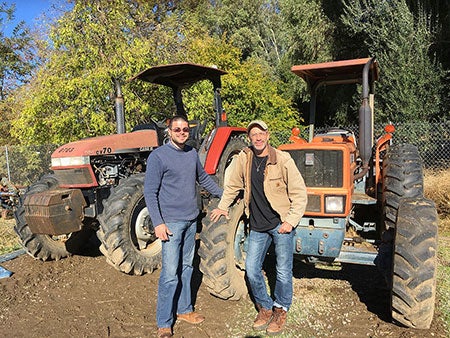FFAR awards $1 million grant to create open source technology for gene discovery in plants

The research is being led by Principal Investigator Pamela Ronald, Ph.D., in the Department of Plant Pathology and the Genome Center at UC Davis. (Photo courtesy of the Foundation for Food and Agriculture Research.)
The Foundation for Food and Agriculture Research, a nonprofit established in the 2014 Farm Bill with bipartisan congressional support, awarded a $1 million Seeding Solutions grant to University of California, Davis to study the genetics of rice plants. Together with researchers at the University of North Carolina and collaborators, the team will develop and implement a chemistry-driven gene discovery approach to identify genes that modulate root traits. The FFAR grant has been matched with funding from the UC Davis Innovation Institute for Food and Health, the Structural Genomics Consortium, AgBiome, and Promega for a total $2.3 million investment.
The project targets protein kinases, enzymes that control diverse biological process in plants, such as root architecture and drought response. Genes corresponding to kinases discovered in this project will be further characterized using a recently established comprehensive collection of mutants to assess their roles in root system architecture and drought tolerance.
“The Foundation for Food and Agriculture Research is encouraged by the collaborative nature of this research,” said Sally Rockey, executive director of the Foundation for Food and Agriculture Research. “This project is a prime example of how public-private partnerships can advance our understanding of plant genetics to develop crops resistant to drought and other climate extremes.”
To accomplish their goals, the team will create and characterize a set of kinase inhibitors that collectively inhibit most of the kinases in rice. The starting point will be approximately 1,000 human kinase inhibitors carefully selected from a library of chemical compounds donated to the partnership from eight pharmaceutical companies. The set will be distributed without restriction to scientists studying other plants and traits, thus serving as a broadly useful platform. The team has agreed to operate under open access principles—specifically prohibiting filing for IP on any of the results and will communicate the results widely.
The research is being led by Principal Investigator Pamela Ronald, Ph.D., in the Department of Plant Pathology and the Genome Center at UC Davis.
“I am delighted to work with this talented and diverse team of researchers to advance rice genetics research. We are grateful for FFAR support that has allowed us to launch this project,” said Ronald.
“The pharmaceutical industry has poured resources into the study of human kinase inhibitors for drug discovery,” said David Drewry, Ph.D., co-PI and professor at University of North Carolina. “We are excited to leverage this investment and apply what we have learned to the important problem of water scarcity. An open science approach will allow us to build our understanding of genes that influence root growth more effectively and efficiently.”
In addition to those listed in the above article, researchers on this project include:
Aled Edwards, Ph.D., collaborator, professor at the University of Toronto and director of the Structural Genomics Consortium; and
Rafael Najmanovich, Ph.D., collaborator, professor at the University of Montreal.
This project is supported by FFAR through its Seeding Solutions grant program, which calls for bold, innovative, and potentially transformative research proposals in the Foundation’s seven Challenge Areas. This grant supports the Overcoming Water Scarcity Challenge Area, which aims to increase the efficiency of water use in agriculture, reduce agricultural water pollution, and develop water reuse technologies.http://www.hpj.com/crops/ffar-awards-million-grant-to-create-open-source-technology-for/article_f6607a7f-8134-55de-a8a4-43ac52925c1b.html



